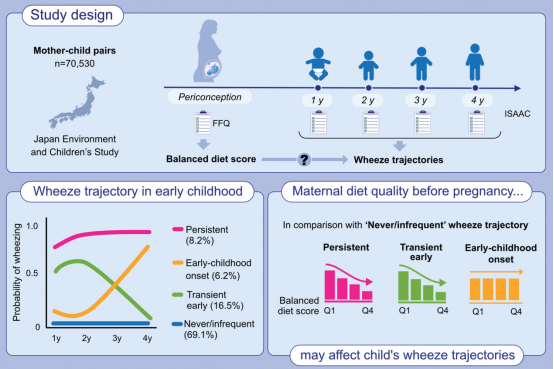Allergy 圍產(chǎn)期母體飲食質(zhì)量與后代喘息軌跡:日本環(huán)境與兒童研究
發(fā)布日期:2023-10-25
——浙大迪迅 譯
背景:產(chǎn)前飲食對(duì)兒童喘息和隨后哮喘風(fēng)險(xiǎn)的作用尚無(wú)定論,這可能部分與喘息表型的異質(zhì)性相關(guān)。我們的目的是確定兒童早期的喘息軌跡,并檢查它們與圍產(chǎn)期母親飲食質(zhì)量的關(guān)系。
方法:分析了來(lái)自日本環(huán)境與兒童研究所的70530對(duì)活產(chǎn)單胎母嬰的數(shù)據(jù)。從1歲到4歲,護(hù)理人員每年使用一份經(jīng)過(guò)修改的兒童哮喘和過(guò)敏國(guó)際研究問(wèn)卷報(bào)告喘息,并使用基于群體的軌跡模型推導(dǎo)出這些軌跡。使用有效的食物頻率問(wèn)卷評(píng)估孕婦在妊娠前三個(gè)月的飲食;總體飲食質(zhì)量是根據(jù)日本膳食指南陀螺的均衡飲食評(píng)分來(lái)確定的。采用多項(xiàng)logistic回歸模型的貝葉斯推理來(lái)檢驗(yàn)?zāi)赣H飲食質(zhì)量與幼兒期喘息軌跡之間的關(guān)系。
結(jié)果:我們確定了四種喘息軌跡:“從不/不頻繁”(69.1%);參照組)、“兒童早期發(fā)病”(6.2%)、“短暫性早期發(fā)病”(16.5%)和“持續(xù)性發(fā)病”(8.2%)。在對(duì)混雜因素進(jìn)行調(diào)整后,與“從不/不頻繁”喘息軌跡相比,在“短暫性早期”和“持續(xù)性”喘息軌跡中母親均衡飲食得分較高的風(fēng)險(xiǎn)降低10%。母親均衡飲食得分與屬于“兒童早期”喘息軌跡無(wú)關(guān)。
結(jié)論:在懷孕前改善母親的飲食質(zhì)量可能會(huì)減少兒童早期的某些喘息表型。

原始出處
Allergy
[IF:14.71]
Periconceptional maternal diet quality and offspring wheeze trajectories: Japan Environment and Children's StudyDOI: 10.1111/all.15916
Abstract:
Background:The role of prenatal diet on childhood wheezing and subsequent risk of asthma is inconclusive, which may be partly due to the heterogeneity in wheezing phenotypes. We aimed to identify wheeze trajectories in early childhood and to examine their associations with periconceptional maternal diet quality.
Methods:Data from 70,530 mother–child pairs of liveborn singletons from the Japan Environment and Children's Study were analysed. Wheezing was reported by caregivers using a modified International Study of Asthma and Allergies in Childhood questionnaire yearly from 1 to 4?years of age, from which trajectories were derived using group-based trajectory modelling. Maternal diet in the year preceding the first trimester of pregnancy was assessed using a validated food frequency questionnaire; overall diet quality was determined using the balanced diet score based on the Japanese Food Guide Spinning Top. Bayesian inference of multinomial logistic regression models was performed to examine the association between maternal diet quality and wheeze trajectory in early childhood.
Results:We identified four wheeze trajectories: ‘never/infrequent’ (69.1%; reference group), ‘early-childhood onset’ (6.2%), ‘transient early’ (16.5%) and ‘persistent’ (8.2%). After adjustment for confounders, a higher quartile of maternal balanced diet score was associated with a lower risk of belonging to the ‘transient early’ and ‘persistent’ wheeze trajectories compared with the ‘never/infrequent’ wheeze trajectory by 10% of both. Maternal balanced diet score was not associated with belonging to the ‘early-childhood onset’ wheeze trajectory.
Conclusion:Improving maternal diet quality prior to conception may reduce certain wheeze phenotypes in early childhood.
First Author:
Hitomi Okubo
Corresponding author:
Shoji F. Nakayama
Correspondence:
Japan Environment and Children's Study Programme Office, National Institute for Environmental Studies, 16-2 Onogawa, Tsukuba, Ibaraki 305-8506, Japan.
Email: fabre@nies.go.jp
 杭州浙大迪迅生物基因工程有限公司
杭州浙大迪迅生物基因工程有限公司

